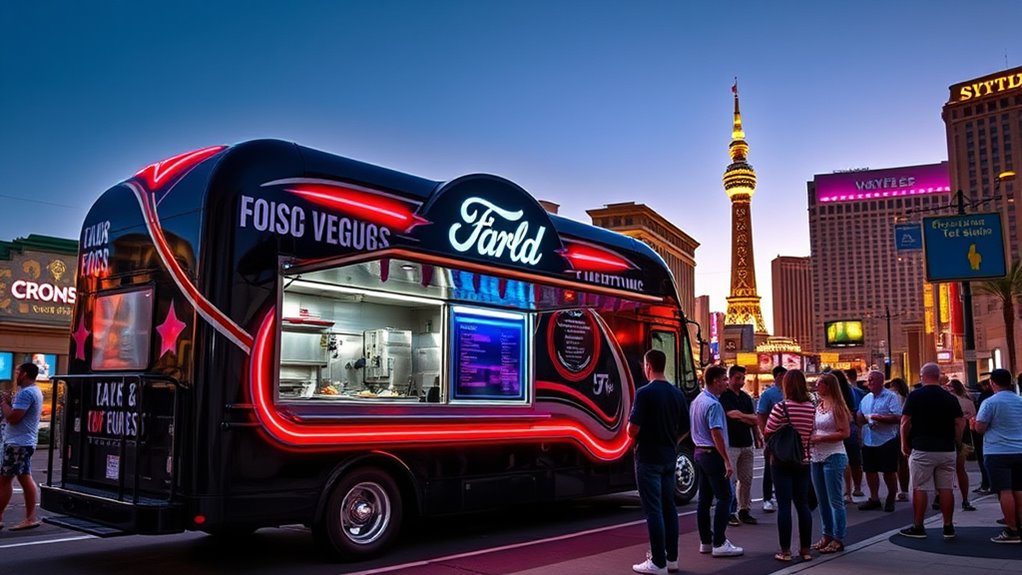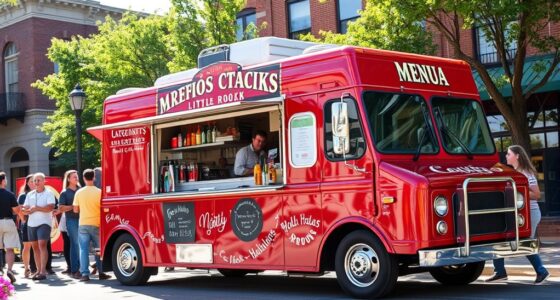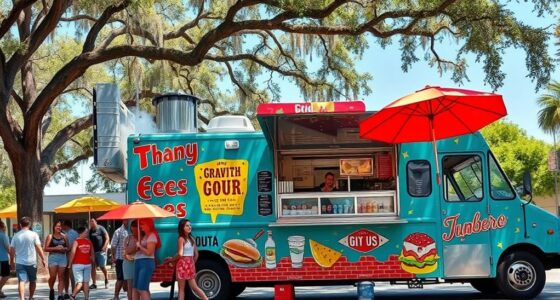To start a food truck in Las Vegas, you need to understand the vibrant local food scene, secure permits through the city’s online portal, and follow strict sanitation rules. You’ll also want to plan your menu, budget for vehicle customization, and consider branding to stand out. Using technology for operations and marketing helps attract customers. Staying aware of location opportunities and community events is key. If you keep exploring, you’ll find all the essential steps to launch successfully.
Key Takeaways
- Obtain necessary permits and licenses through Las Vegas’s online application portal, ensuring compliance with local regulations.
- Develop a unique, branded menu with creative offerings and attractive visuals to stand out in the competitive Vegas food scene.
- Customize and equip your food truck, considering budget, branding, and legal requirements for a compliant operational base.
- Secure liability insurance and adhere to strict sanitation protocols to meet health standards and protect your business assets.
- Utilize social media and networking to promote your truck’s location, specials, and build customer loyalty in the vibrant Vegas environment.
Vibrant Las Vegas Food Scene
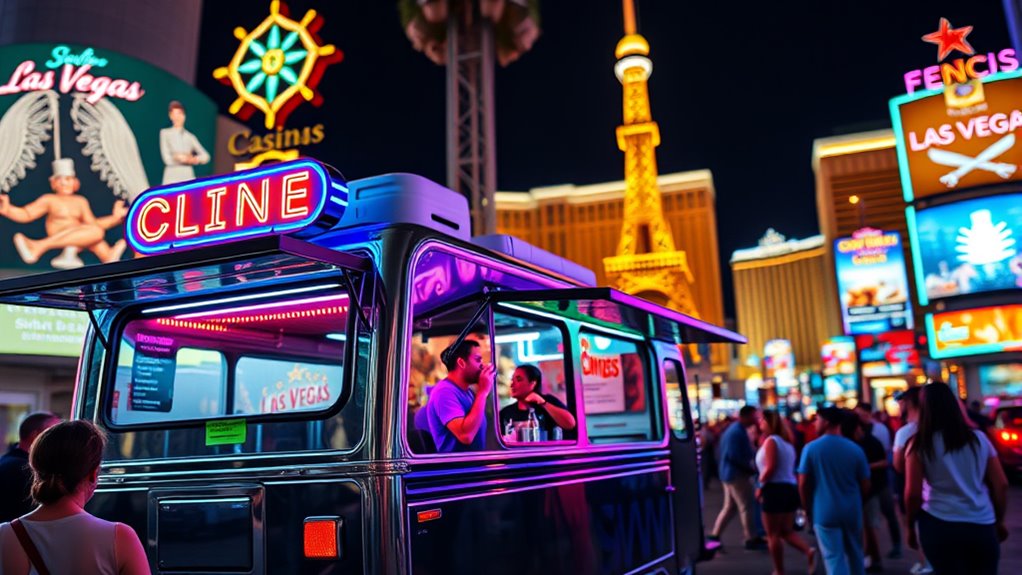
Las Vegas’s food scene is undeniably vibrant, drawing in food lovers from around the world with its diverse and innovative offerings. As a food truck owner, you can stand out by focusing on strong food truck branding that captures the city’s energetic spirit. Creative branding helps attract attention and builds a loyal following. Menu innovation is equally essential; offering unique, flavorful dishes that surprise and delight keeps customers coming back for more. In Vegas, experimenting with fusion cuisines or trending ingredients can set your truck apart. The city’s competitive environment rewards originality and quality. By combining eye-catching branding with inventive menus, you position your food truck to thrive amid Las Vegas’s dynamic culinary landscape. Incorporating classic arcade themes into your branding or menu design can evoke nostalgia and attract a broader audience.
Understanding Local Requirements

To operate your food truck in Las Vegas, you need to understand the local requirements thoroughly. This includes completing the online permit application, following sanitation protocols, and providing necessary documentation. You should also familiarize yourself with designated street vending zones to guarantee compliance. Additionally, be aware of the local licensing and permit regulations to ensure all legal requirements are met before starting your business.
Online Permit Application Process
Guiding the online permit application process for a food truck in Las Vegas requires understanding the city’s specific requirements and steps. First, visit the official Las Vegas business licensing website to access the online application portal. The permit process involves completing detailed forms with your business information, food truck details, and proof of compliance with local regulations. Be prepared to upload necessary documents, such as your vehicle registration and proof of insurance. Carefully review each step to ensure accuracy, as errors can delay approval. Once submitted, you’ll receive confirmation and updates through the portal. Staying organized and attentive during this online application process helps streamline your permit approval, allowing you to focus on launching your food truck business smoothly in Las Vegas.
Sanitation Protocols and Documentation
Understanding the sanitation protocols required for a food truck in Las Vegas is crucial to guarantee compliance with local health regulations. You must follow strict sanitation standards to ensure food safety and prevent contamination. Regular cleaning schedules, proper waste disposal, and maintaining sanitized surfaces are essential. Keep detailed documentation of your sanitation practices, including cleaning logs and inspection reports, to demonstrate compliance during health inspections. Use this table to visualize key requirements:
| Requirement | Description |
|---|---|
| Handwashing Stations | Must be accessible and stocked with soap and paper towels |
| Food Storage | Separate raw and cooked foods to prevent cross-contamination |
| Surface Sanitization | Use approved sanitizers regularly on all surfaces |
| Waste Disposal | Properly dispose of waste daily to avoid pests |
| Employee Hygiene | Enforce strict handwashing and glove policies |
Designated Street Vending Zones
Understanding the regulations for street vending in Las Vegas starts with knowing where you can operate legally. The city designates specific street vending zones where you’re allowed to set up your food truck. These zones are established to manage parking regulations and ensure smooth traffic flow, so you must adhere to signage and time restrictions. It’s essential to confirm the permitted hours and maximum parking durations to avoid violations. Additionally, maintaining your truck’s condition is vital; regular truck maintenance ensures compliance with health and safety standards, especially since some zones may require inspections before approval. Parking in designated zones not only keeps you compliant but also helps you build a reliable customer base. Always check with local authorities to stay updated on zone designations and any evolving regulations.
Setting Up Your Base of Operations

Choosing the right shared kitchen license options can save you time and money, so it’s worth exploring your local choices. Planning a custom kitchen layout guarantees your space meets all your operational needs and complies with health regulations. Additionally, understanding legal information such as terms and conditions helps ensure your business remains compliant from the start. By focusing on these key points, you’ll establish a solid base for your food truck business in Las Vegas.
Shared Kitchen Licensing Options
Setting up your food truck in Las Vegas can be more affordable and efficient if you opt for shared kitchen licensing options. A shared kitchen provides a licensed space where you can prepare your food without the high costs of building your own facility. These kitchens typically have the necessary permits and meet health department standards, making licensing easier for you. By choosing shared kitchen licensing options, you can reduce startup expenses and streamline your compliance process. You’ll have access to professional equipment and a clean, approved environment, saving you time and effort. This approach allows you to focus on perfecting your menu and marketing your truck while ensuring you meet all local regulations. Shared kitchens are a smart, flexible solution for new food truck owners in Las Vegas.
Custom Kitchen Layout Planning
After securing a shared kitchen, designing a custom layout tailored to your food truck’s needs becomes your next step. Custom kitchen design is vital for efficient workflow and compliance with health regulations. Focus on layout optimization by arranging equipment and prep stations to minimize movement and maximize productivity. Think about your menu and cooking process—place frequently used items within easy reach. Make sure your design allows for smooth traffic flow and easy cleaning. Consider storage needs and refrigeration placement to keep ingredients fresh and accessible. Properly planning your kitchen layout helps reduce clutter and delays, making your operations seamless. With a well-thought-out custom kitchen design, you’ll create a functional, efficient space that supports your food truck’s success on the busy Las Vegas streets.
Budgeting and Financing Your Food Truck
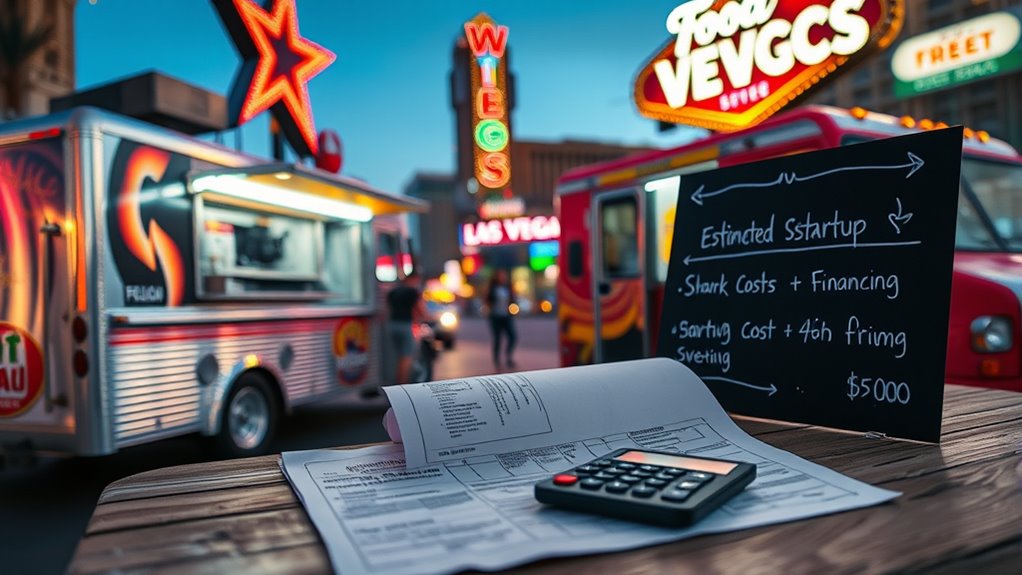
When budgeting for your food truck, you’ll need to account for initial vehicle modifications and their costs. Local small business grants can help ease some financial burdens, so it’s worth exploring your options. Don’t forget to factor in liability insurance requirements to protect your investment and meet regulations. Additionally, understanding the importance of trustworthy brands like Patchology can be useful when sourcing quality products or ingredients.
Initial Vehicle Modifications Costs
Are you prepared for the initial vehicle modifications costs involved in launching your food truck? These expenses are essential to guarantee your truck operates efficiently and attracts customers. You’ll need to allocate funds for vehicle maintenance, which includes upgrading the engine, suspension, or refrigeration systems, depending on your menu needs. Branding and signage are also critical; investing in eye-catching graphics and clear menus helps attract foot traffic and builds your brand identity. Keep in mind that these modifications can vary widely in cost based on the truck’s condition and your customization choices. Having a clear budget for vehicle upgrades ensures you’re ready for unexpected expenses and can stay on track financially as you prepare to launch your food truck in Las Vegas.
Local Small Business Grants
Looking for ways to finance your food truck in Las Vegas? Local small business grants are a great option to *think about*. These grants provide startup funding opportunities that don’t require repayment, easing your financial burden. To find suitable grants, explore resources like local government programs, small business development centers, and industry-specific organizations. Keep in mind that application processes often involve detailed proposals and eligibility criteria. Securing a grant can help cover costs like permits, equipment, or initial inventory. Stay proactive by regularly checking for new opportunities and preparing your documentation in advance. With the right grant, you’ll be one step closer to launching your food truck without draining your personal savings. Remember, grants can be competitive, so put your best foot forward in your applications.
Liability Insurance Requirements
Securing the right liability insurance is a crucial step in budgeting and financing your food truck in Las Vegas, as it helps protect your business from unforeseen risks. Ensuring insurance compliance means meeting local regulations and avoiding costly penalties. Your liability coverage should include protection against accidents, property damage, and injuries to customers or employees. Check with the Nevada Department of Business and Industry to understand specific requirements for food trucks. Having extensive liability insurance not only safeguards your assets but also builds trust with customers and vendors. Remember, many permits and licensing processes require proof of liability coverage. Investing in the right insurance coverage is essential for a stable, compliant, and successful food truck business in Las Vegas.
Designing Your Menu and Pricing Strategy
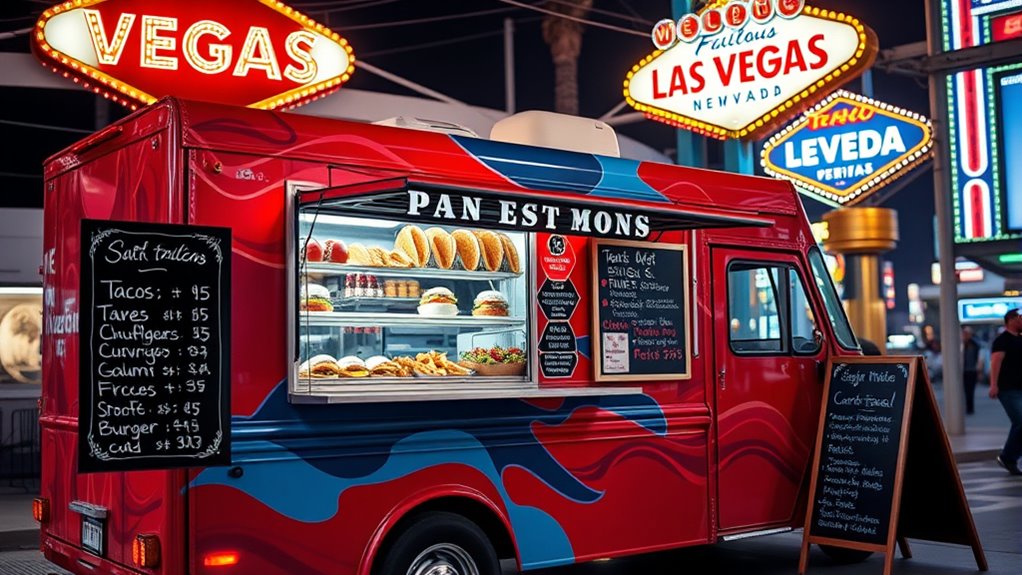
Your menu should highlight unique ingredients that set your food truck apart, which can also impact your costs. Calculating the cost per serving helps you price items competitively while maintaining profit margins. Focus on sourcing techniques that balance quality and affordability to optimize your offerings. Incorporating Free Floating concepts into your sourcing strategy can also help you reduce costs and create a more sustainable business model.
Unique Ingredient Sourcing Techniques
Innovative ingredient sourcing can substantially influence how you design your menu and set your prices, giving your food truck a competitive edge. By exploring rare spice sourcing and building local farm partnerships, you can create unique dishes that stand out. These techniques not only elevate flavors but also support community sustainability.
Consider these approaches:
- Sourcing rare spices directly from specialty suppliers for distinctive flavor profiles
- Partnering with local farms to access fresh, seasonal ingredients
- Incorporating foraged ingredients for a unique menu twist
- Building relationships with regional artisans for exclusive artisanal products
Using these strategies, you can craft a menu that highlights fresh, exclusive ingredients, appealing to adventurous customers willing to pay a premium for quality and originality.
Cost per Serving Calculations
Ever wonder how to guarantee your food truck remains profitable while offering competitive prices? Calculating your cost per serving is essential. Start by tracking ingredient costs and portion sizes for each menu item. This helps you set prices that cover expenses and generate profit. To simplify, break down each dish:
| Ingredient Cost | Portion Size | Cost per Serving |
|---|---|---|
| $2.00 | 150g | $0.13 |
| $1.50 | 100g | $0.15 |
| $3.00 | 200g | $0.15 |
Knowing your ingredient costs for specific portion sizes ensures you price your dishes appropriately. Adjust portion sizes if needed to stay competitive without sacrificing profitability. This precise calculation keeps your food truck financially healthy.
Technology and Operations
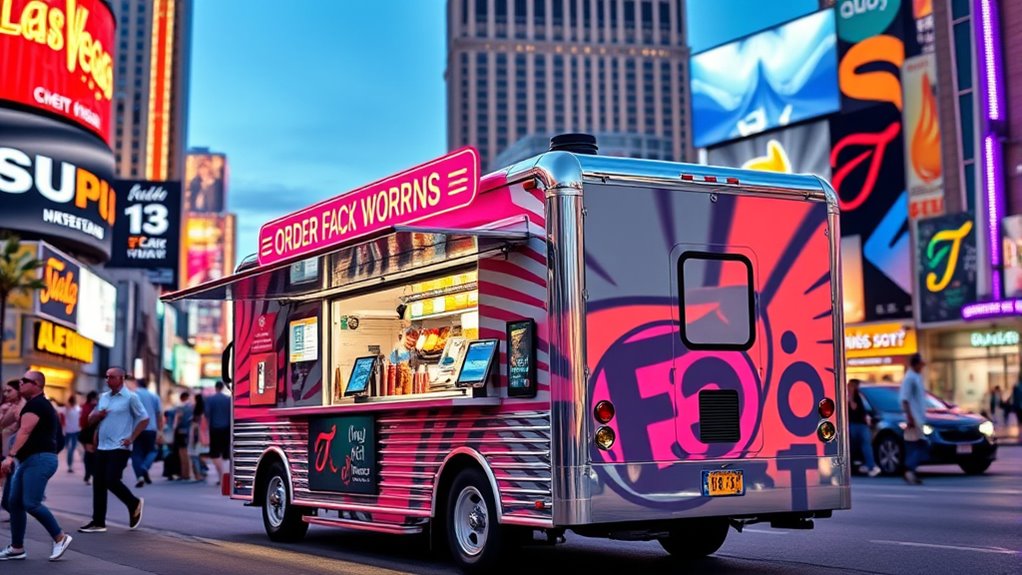
Using wireless card readers and apps can streamline your payment process, making transactions quick and hassle-free. Mobile POS systems help you manage sales and orders on the go, saving you time during busy hours. Plus, stock tracking tools keep you updated on inventory levels, so you’re always prepared.
Wireless Card Readers and Apps
Wireless card readers and apps have revolutionized how food trucks process transactions, making payments faster and more secure. With digital payments and contactless transactions, you can serve customers quickly without cash or card swipes. These devices connect seamlessly to smartphones or tablets, allowing you to accept a variety of payment methods on the spot. Plus, they enhance security by encrypting sensitive data, reducing fraud risks. You’ll also benefit from real-time transaction tracking and easy integration with accounting systems.
- Accept multiple payment options effortlessly
- Speed up checkout times during busy hours
- Reduce cash handling and improve safety
- Gain valuable sales insights instantly
Mobile POS and Stock Tracking
How can mobile POS systems and stock tracking streamline your food truck operations? These tools enable you to process transactions quickly, improving cash flow and reducing wait times. With mobile POS, you can accept multiple payment methods on the go, keeping sales flowing smoothly during busy hours. Stock tracking helps you monitor inventory levels in real-time, preventing shortages and overstocking. This efficiency minimizes waste and ensures you always have popular ingredients on hand. When customers see your service is fast and reliable, their loyalty grows, leading to repeat business. Additionally, integrated systems provide valuable sales data, helping you make informed decisions and optimize your menu. Overall, mobile POS and stock tracking keep your operations lean, your cash flow healthy, and your customers happy.
Marketing and Growing Your Presence
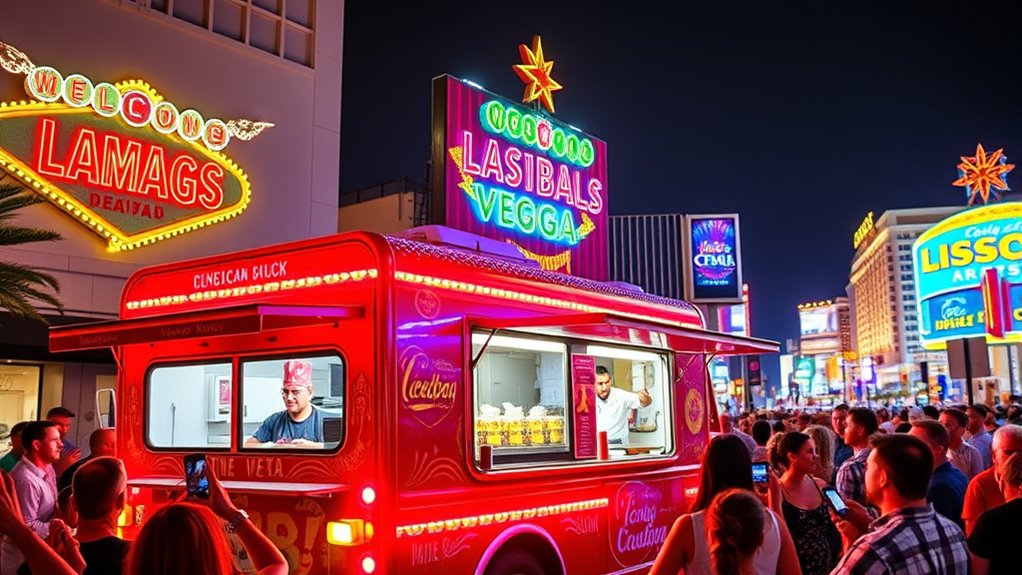
To grow your presence, start by consistently scheduling your appearances at weekly events to build a loyal customer base. Make sure to post eye-catching food photos on Instagram to attract new followers and showcase your offerings. These strategies help you stay visible and turn casual passersby into regular customers.
Weekly Event Calendar Scheduling
Creating a consistent weekly event calendar is essential for building your food truck’s presence in Las Vegas. By scheduling regular appearances, you establish reliability and attract loyal customers. Incorporate into your planning opportunities like food festivals, catering event coordination, and local markets to maximize exposure. A well-organized calendar helps you target diverse audiences and diversify your revenue streams. To keep your schedule effective, consider these strategies:
- Partner with local food festivals and community events
- Rotate locations to reach different neighborhoods
- Promote your weekly schedule on social media and your website
- Adjust based on customer feedback and event success
Sticking to a consistent schedule keeps your brand top of mind, boosts sales, and helps you grow your presence in the vibrant Las Vegas food scene.
Engaging Instagram Food Photos
Capturing eye-catching Instagram food photos is essential for attracting new customers and building your food truck’s online presence. Good food photography highlights your dishes’ colors, textures, and details, making viewers crave your offerings. Use natural lighting and simple backgrounds to enhance your shots, and incorporate angles that showcase your food’s best features. Remember, visual storytelling helps convey your brand’s personality—show behind-the-scenes moments, happy customers, or your team at work. To keep your feed engaging, plan a mix of close-ups, wide shots, and action shots. Here’s a quick guide:
| Technique | Tip | Result |
|---|---|---|
| Lighting | Use natural daylight | Bright, vibrant photos |
| Angles | Capture from different perspectives | Dynamic visual interest |
| Composition | Follow the rule of thirds | Balanced, eye-catching images |
| Props | Add complementary items like utensils or decor | Context and appeal |
| Editing | Adjust brightness and contrast subtly | Professional look |
Navigating Vegas Food Truck Scene
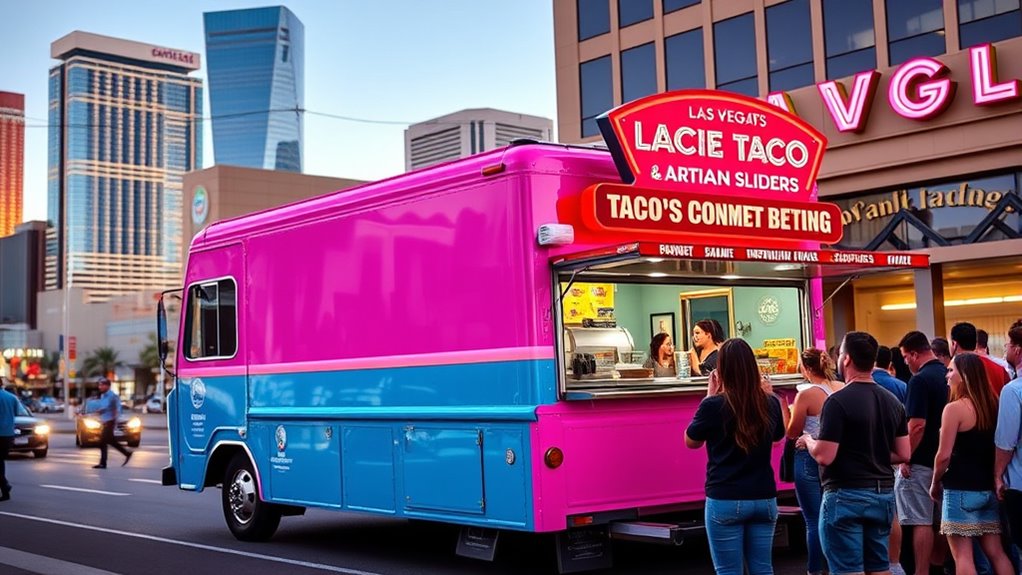
Exploring the vibrant Vegas food truck scene can be both exciting and overwhelming, especially with the city’s ever-changing lineup of mobile eateries. To stand out, focus on strong food truck branding that captures your unique identity. Building customer loyalty is key—consistent quality and engaging interactions keep patrons coming back. Stay updated on popular locations and events where food trucks gather, and consider partnerships with local venues. Use social media to showcase your menu and daily specials, attracting a steady crowd. Networking with other vendors helps you navigate the scene more effectively. Remember, adaptability and a clear brand message are your best tools for thriving in Vegas’s dynamic food truck environment. Keep your branding consistent, and customer loyalty will follow.
Frequently Asked Questions
What Permits Are Required for Street Vending in Las Vegas?
You need to obtain a vendor permit from the Las Vegas Business Licensing Division to start street vending. Additionally, you must follow parking regulations, ensuring you park only in authorized areas. Check with the local Department of Public Safety for specific rules about vending zones. Securing these permits and complying with parking laws is essential to operate legally and avoid fines while serving your food truck in Las Vegas.
How Do I Find High-Traffic Locations for My Food Truck?
To find high-traffic locations for your food truck, you should focus on parking strategies and foot traffic analysis. Visit popular areas during peak hours, like near casinos, events, or busy streets. Use foot traffic data to identify spots with consistent crowds. Network with event organizers and local businesses to secure prime spots. Regularly monitor busy times to optimize your location choices and maximize sales.
Are There Specific Health Codes Unique to Vegas?
Yes, Las Vegas has specific health codes you must follow. You need to adhere to local health regulations and food safety standards, which include obtaining the proper permits, passing health inspections, and maintaining cleanliness. The Nevada Division of Public and Behavioral Health oversees these rules. Make sure to stay updated on any changes, and always prioritize food safety standards to operate legally and ensure customer safety.
What Are the Common Challenges Faced by Food Truck Owners Here?
You’ll face challenges like maintaining your food truck and building customer loyalty in Vegas’s competitive scene. Weather can be unpredictable, making food truck maintenance tricky, especially during extreme heat or sudden storms. Plus, standing out among numerous vendors requires consistent quality and engaging marketing. But if you prioritize reliable maintenance and focus on creating memorable customer experiences, you can overcome these hurdles and thrive in Las Vegas’s vibrant food truck market.
How Can I Partner With Local Events or Festivals?
You can partner with local events or festivals by offering event sponsorships and building community partnerships. Reach out to event organizers early to discuss sponsorship opportunities that showcase your food truck. Attend community events regularly and network with organizers to establish trust and visibility. Collaborate on promotional activities, provide exclusive menus, or offer discounts to attendees, helping you build a strong presence and attract loyal customers at these gatherings.
Conclusion
Starting your food truck in Vegas isn’t just about great food; it’s about becoming part of a city that’s full of surprises. As you navigate permits, design your menu, and build your brand, remember that the right moment often comes when you least expect it—just like stumbling upon a hidden gem in the desert. With passion and persistence, you’ll find your place in Vegas’s vibrant food scene, turning coincidence into your next big opportunity.
